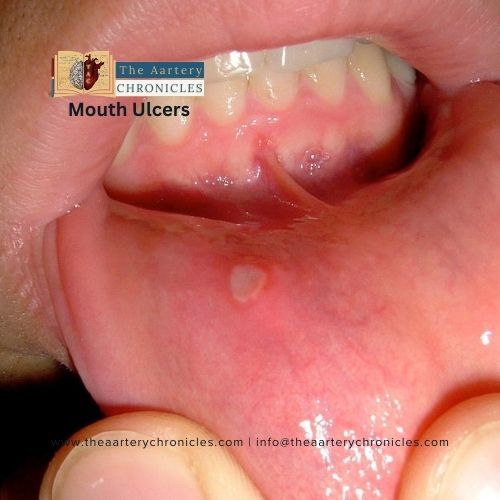

Insights into the Causes and Cure for Mouth Ulcers
Mouth ulcers, also known as oral ulcers, are painful lesions that appear as tiny sores on the tongue, gums, inner cheeks, or roof of the mouth. [1,2] A multitude of factors, such as loose or uncomfortable dentures, broken teeth, and bacterial, fungal, or viral infections, can contribute to the development of these sores. [2,3]
Mouth ulcers manifest in various forms, ranging from canker sores that typically resolve on their own to sores associated with conditions such as oral cancer. This article dives deeply into the possible causes, symptoms and treatments for different types of ulcers.
What is a Mouth Ulcer?
A sore that develops anywhere in your mouth is called a mouth ulcer. It’s possible to have one or more of these sores, which are typically red, yellow, or white. [1]
Mouth ulcers usually appear on any of the soft tissues of the mouth, like:
- Tongue
- Inner lips
- Gums
- Inner cheeks
- Gingiva
- Palate
- The floor of the mouth
Most of the oral ulcers, though painful, are harmless in nature and don’t last longer than two weeks, but some of them may be indicative of an underlying disease or disorder. [1,2]
Symptoms And Causes Of Mouth Ulcer
What are the symptoms of a mouth ulcer?
Mouth sores are typically spherical, round, or ovoid ulcers with
- Confined and circumscribed margins
- Erythematous haloes- red around the edges
- Yellow or gray floors [3,4]
Aside from being extremely painful, oral ulcers can make it difficult to chew, swallow, and speak. Mouth ulcers may be solitary or multiple, and some other symptoms of oral ulcers include:
- Difficulty eating spicy or salty food items
- Ulcerations
- Swelling around the sores
- Increased soreness, especially while brushing [1,3]
What are the causes of a mouth ulcer?
Some of the causes of mouth ulcers may include:
1. Infections:
- Viral Infections: Herpes simples, varicella-zoster, Epstein-Barr, Coxsackie A, and the human immunodeficiency virus (HIV) can cause oral sores [5].
- Bacterial Infections: Syphilis and tuberculosis are bacterial infections associated with mouth sores [5].
2. Autoimmune Disorders:
Some of the autoimmune conditions like Crohn’s disease, lichen planus, Behcet’s disease, systematic lupus erythematosus, or Wegener’s granulomatosis may lead to mouth ulcers [6].
3. Trauma:
Trauma, including biting the inside of the cheek, ill-fitting dentures, fractured or malformed teeth, overheated food, or dental appliances, can contribute to oral sores. [5]
4. Hematologic disorders:
Disorders of the blood are known as hematologic disorders and some of the disorders, like anemia, neutropenia, and hypereosinophilic syndrome can cause mouth sores. [6]
5. Fever Syndromes:
Disorders causing fever without a specific origin, known as fever syndromes, may lead to the development of mouth sores. [6]
6. Vesiculobullous disorders:
Characterized by the formation of vesicles and bullae, vesiculobullous disorders encompass a distinct group of conditions. Some of these disorders, such as mucous membrane pemphigoid, pemphigus vulgaris, or erosive lichen planus, may manifest with chronic and multiple oral ulcerations.. [5]
7. Nutrient deficiencies:
Mouth ulcers can result from dietary deficiencies in iron, zinc, folate, and vitamins B1, B2, B6, and B12.
8. Hormonal Imbalance:
Hormonal imbalances during pregnancy, puberty, or the regular menstrual cycle, with elevated salivary estrogen levels, may lead to local physical changes causing oral ulcerations. [5]

Types of Mouth Ulcers
Several different types of oral ulcers include:
- Canker sores: Canker sores, or aphthous ulcers, are the most prevalent type of mouth ulcers, appearing as tiny, red-bordered ulcers with white or gray coloration. Although the precise aetiology of canker sores is unknown, some specialists speculate that immune system issues, bacteria, or viruses could be at play. Canker sores can be more likely to occur in cases of fatigue, stress, or allergies. Although these ulcers typically resolve within a week or two, recurrent outbreaks are frequently observed. [2]
- Oral lichen planus: Itchy rashes and white, lace-like lesions inside the mouth are characteristic symptoms of this disorder. Oral lichen planus is an immunological response that tends to primarily affect women and individuals classified as female at birth (AFAB), particularly those aged 50 years or older. [1]
- Leukoplakia: A thick white patch known as leukoplakia is brought on by excessive cell proliferation and can appear on the tongue, inside of the cheeks, or on the gums. It is quite commonly seen in tobacco users and other potential causes include chewing on the inside of the cheek or denture irritation. Leukoplakia can either be benign, non-cancerous, or precancerous, depending on its location and appearance. [2]
- Erythroplakia: Red lesions (spots or patches) under the tongue or below the lower front teeth are the characteristic features of erythroplakia. It is classically associated with chewing or smoking tobacco. Erythroplakia is typically considered a malignant or precancerous condition, distinguishing it from leukoplakia. [1]
- Oral Thrush: Oral thrush, also known as candidiasis, is a fungal infection caused by the overgrowth of a yeast named Candida albicans. It causes reddish-cream spots to appear on the moist surfaces of the mouth. Painful soft tissues beneath the patches may result in swallowing difficulties and a diminished sensation of taste. [1,2]
- Oral Cancer: Unhealed red or white mouth sores or ulcers that persist for longer than an interval of 3 weeks might be signs of oral cancer lesions. [1]
Management And Treatment Of Mouth Ulcers
How do you treat mouth sores and ulcers?
Idiopathic mouth sores typically heal on their own within 1-3 weeks. But some common mouth ulcer treatments that help alleviate pain and discomfort are:
- Topical agents: Apply triamcinolone acetonide ointment
- Antiseptic gel or mouth rinses: Use Triclosan
- Systemic agents: Systemic corticosteroids like dexamethasone
- Immunosuppressants: Azathioprine can be prescribed in certain cases. [4]
What are the home remedies to cure a mouth ulcer?
Several natural remedies can be tried at home:
- Avoid certain food and drinks: Until the lesion has healed, it involves avoiding certain food items and drinks like
- Alcoholic drinks
- Carbonated drinks
- Hot food items and beverages
- Spicy food or acidic food
- Hard and sharp-edged food items like bread rolls, potato chips, and raw vegetables. [7]
2. Maintain good oral hygiene: Practicing good oral and dental hygiene to prevent inflammation around the sores helps in the healing process. [7]
3. Stay Hydrated: Drink plenty of water. [1]
4. Saltwater Rinse: Rinse the mouth with warm salt water a few times a day. [1]
5. Hydrogen Peroxide Rinse: Rinse the mouth with a mixture of equal parts hydrogen peroxide and water twice a day. [1]
6. Over-the-counter (OTC) Topical Anesthetic: Consider using OTC topical anesthetics. [1]
How to Prevent Mouth Ulcers?
Although mouth ulcers cannot be completely avoided, certain steps can lower the risk:
- Maintain Oral Hygiene: Brush teeth twice daily with a soft-bristled brush and floss once daily to uphold good oral health.
- Healthy Diet: Consuming a diet high in fresh and healthy produce.
- Regular Dental Check-ups: Visiting the dentist regularly for dental examinations and dental cleaning.
- Mouth Ulcers: Types, Causes & Treatment (clevelandclinic.org)
- Common mouth sores - The Journal of the American Dental Association (ada.org)
- Mouth ulcers and other causes of orofacial soreness and pain - PMC (nih.gov)
- Oral Aphthous: Pathophysiology, Clinical Aspects and Medical Treatment - PMC (nih.gov)
- Oral Ulcers Presentation in Systemic Diseases: An Update - PMC (nih.gov)
- Recurrent Aphthous Stomatitis: A Review - PMC (nih.gov)
- Mouth sores – What can you do yourself? - InformedHealth.org - NCBI Bookshelf (nih.gov)

Dr. Anjali Singh, BDS [KGMC, Lucknow]
- Medicine and Diseases
- Nutrition and Diet
Lorem ipsum dolor sit amet, consectetur adipiscing elit. Ut elit tellus, luctus nec ullamcorper mattis, pulvinar dapibus leo.
















